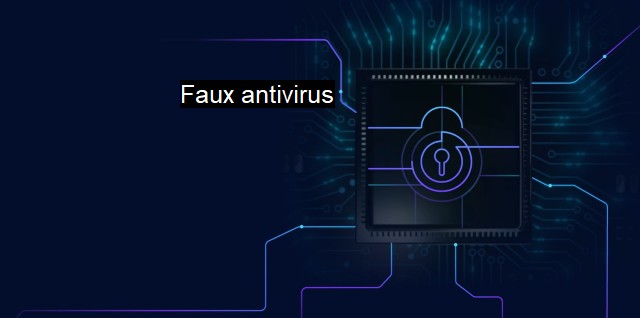What are Faux antivirus?
The Danger of Faux Antivirus: How Rogue Software Can Steal Your Money and Your PCs
Faux antivirus is a term used to describe malicious software that poses as legitimate antivirus or security software. This fraudulent software causes more harm to the user's system instead of providing protection, hence the term "Faux," which means false or fake.The intent behind a Faux antivirus is to deceive its users into believing that it protects their devices against threats such as malware, viruses, and other cyber attacks. instead of offering these security functions, Faux antivirus contaminates the system with malware designed to compromise the assurance of a device or network security.
Faux antivirus schemes usually begin with a sudden pop-up alert, warning of a virus detected in the computer. The user, unsettled and worried by the alert, downloads the recommended antivirus software presented in the pop-up. In this scenario, the user believes that by downloading and running the suggested software, they are defending their system against threats. Unfortunately, that is not the case. Running a Faux antivirus typically invites real malware into the system.
The historical context of Faux antivirus traces back significantly to the beginning of the internet era when online security was unfamiliar ground. This lack of exposure to threats made it easier for hackers and scammers to exploit unsuspecting users' systems. Faux antivirus schemes primitively started in the form of false system alerts. With time, culprits have grown sophisticated and Faux antivirus schemes have evolved into complex behaviors such as locking computers and demanding ransoms, stealing critical user data, and creating platforms for other forms of cybercrime.
Faux antivirus poses a significant risk, primarily because its operation relies on one of the oldest yet most effective forms of cyber attack - social engineering. In this case, the attacker plays on the average user's fear of mistakenly downloading a virus or becoming a victim of a cyber-attack, using that fear to trick the user into downloading harmful alternatives. Once the software is in the user's system, it leaves a window for the attacker to manipulate the user's data, breach their privacy, gain unauthorized access to privileged information, or even control the user's computing system remotely.
Faux antivirus is a cybersecurity threat not just because of the malicious actions it executes in the victim's system, but also because of its effective ability to continue fooling its victims. Once downloaded, a Faux antivirus often replicates the functionality of real antivirus software to create a sense of legitimacy among victims. It may frequent security warnings, run fake security scans, or force users into buying the premium version of a piece of non-existent protection software.
In this era of growing reliance on technology, it is crucial to stay aware and vigilant of cybersecurity trends and threats. Installing trusted antivirus software from official websites or authorized distributors is always recommended. Users should also be wary of unsolicited popups urging you to download security software, but instead consult with an IT professional or check with an antivirus provider before making any commitments.
Today's fight against Faux antivirus and, in general, the cybersecurity battlefield, is more than employing software solutions, algorithms, and technology designed to shield our computing systems. It is also an endeavor towards building awareness, educating people about cyber threats, and teaching individuals ways to protect themselves actively online. As much as cybersecurity is about powerful antivirus software and firewalls, it is equally centered around human consciousness and sensitization towards the trends and tactics of modern cybercrimes. This blend of technological sophistication and human acuity can help the world stay ahead in the constant perils of cybersecurity.

Faux antivirus FAQs
What is faux antivirus software
Faux antivirus software, also known as fake or rogue antivirus, is a type of malicious software that pretends to be a legitimate antivirus software but actually infects your computer or device with malware.How does faux antivirus software infect a computer?
Faux antivirus software is often distributed through social engineering tactics, such as pop-up ads, fake security alerts, and spam emails. Once a user clicks on a link or downloads a file, the faux antivirus software will install itself on the computer and display fake security alerts to scare the user into purchasing the full version of the software.What are the risks of having faux antivirus software on my computer?
Faux antivirus software can infect your computer with malware, steal your personal information, and slow down your computer's performance. It can also open backdoors for cybercriminals to remotely control your computer or device.How can I protect myself from faux antivirus software?
To protect yourself from faux antivirus software, avoid clicking on suspicious links, downloading files from untrustworthy websites, and opening email attachments from unknown sources. You should also regularly update your antivirus software and use a reputable cybersecurity program that can detect and remove faux antivirus software.| | A | | | B | | | C | | | D | | | E | | | F | | | G | | | H | | | I | | | J | | | K | | | L | | | M | |
| | N | | | O | | | P | | | Q | | | R | | | S | | | T | | | U | | | V | | | W | | | X | | | Y | | | Z | |
| | 1 | | | 2 | | | 3 | | | 4 | | | 7 | | | 8 | | |||||||